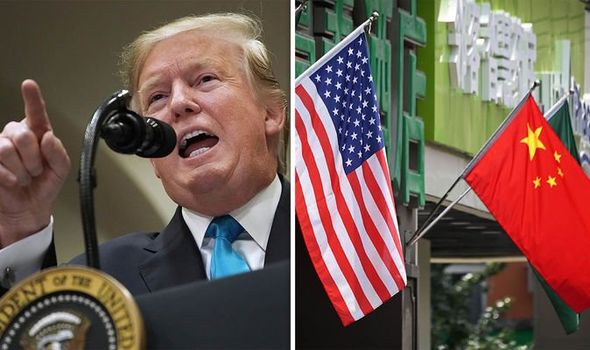HONG KONG: Asian equity markets tanked and the yuan hit an 11-year low Monday after Donald Trump ramped up his trade war with China by imposing more tariffs on more than half-a-trillion dollars worth of imports.
The decision on Friday stunned investors, who ran for the hills, hammering European and Wall Street stocks, while safe havens such as the yen and gold — go-to assets in times of turmoil and uncertainty — surged.
The move, which also came with an outburst against China by the American president and a call for US firms to leave the country, overshadowed a broadly dovish speech by Federal Reserve boss Jerome Powell but one that fell short of Trump’s demand for deep interest rate cuts.
Friday’s tariffs hike was in response to Beijing’s decision to raise levies on USD 75 billion of US goods.
Tariffs on USD 250 billion Chinese goods will go to 30 per cent and those planned on USD 300 billion in Chinese goods go to 15 per cent from October 1.
On Monday, China’s yuan currency fell to 7.1487 to the dollar, its weakest level since early 2008 at the height of the global financial crisis.
The drop is likely to ire Trump, who has labelled Beijing a currency manipulator.
“The gloves are coming off on both sides and as such yuan depreciation is an obvious cushion against US tariffs,” Mitul Kotecha, a senior emerging markets economist at Toronto-Dominion Bank, told Bloomberg News.
“As long as China can ensure that yuan weakness is well controlled ie it does not provoke strong outflows, expect to see further depreciation in the currency.”
On equity markets, Hong Kong led losses, slumping more than three per cent, with investors also spooked by fresh violent protests in the city that saw police use water cannon for the first time.
Shanghai lost 1.3 per cent and Tokyo ended the morning more than two per cent off.
Sydney, Seoul, Wellington, Jakarta and Taipei all sank more than one per cent.
The flight from risk into safer havens saw a gold jump to a six-year high around USD 1,550 per ounce, while the Japanese yen was at its strongest level since the end of 2016.
Fears about the trade war’s impact on demand also hit oil prices with both main contracts falling more than one per cent, extending Friday’s sell-off.
The tariffs news overshadowed Powell’s much-anticipated speech on Friday, where he pledged to ensure US growth and pointed to fresh stimulus if inflation softens.
He acknowledged the bank has no “rulebook” for dealing with the US-China trade war but did not announce any more rate cuts, sparking outrage from Trump, who blames the Fed boss for holding the economy back.
“As usual, the Fed did NOTHING!” Trump said.
“My only question is, who is our bigger enemy, Jay Powel or Chairman Xi?” Trump said, misspelling the Fed chief’s name and referring to Chinese leader Xi Jinping.
“Referencing the Fed chair as the enemy is, frankly, just par for the course… but referencing President Xi now as the enemy rather than ‘my friend’ is a lot more serious,” said Ray Attrill at National Australia Bank.
“Indeed, the fallout is already apparent in an editorial in Saturday’s state-run People’s Daily, saying China will follow through with retaliatory measures announced Friday and fight the trade war to the end in the face of the US’s failure to keep its promises.” AFP







